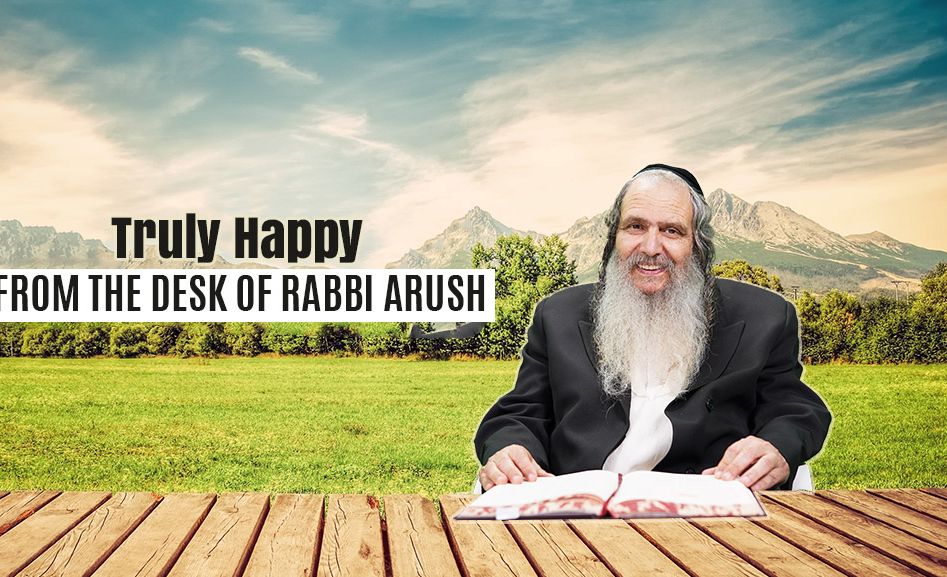
A Spiritual Prescription
We all suffer in one form or another: frustrations, aggravations, and failures. Is it humanly possible to deal with these in a spirit of acceptance and love, or are we simply deluding ourselves? The Kalever Rebbe helps us understand the dilemma.

You shall take the inauguration ram and cook its flesh in a holy place. (Shemot 29:31)
Grateful for Hardships
In life, someone may face a hardship or challenge or even tremendous tragedy and suffering, Heaven forbid. In those moments, yidden (Jews) are expected to accept the physical trials and tribulations with love and gratitude to Hashem for presenting those difficulties, as Chazal and the seforim hakedoshim teach. This can seem like a daunting expectation, and to some, even unrealistic. How can a yid gain this perspective? How can they truly accept life’s suffering with love and gratitude?
There is a fundamental explanation in the Be’er Mayim Chaim in Parshat Chukat. There, the Rebbe explains in great length why a yid must accept suffering with love. Through that explanation, a yid can truly gain this perspective.
Bless the Good and Bad
The Rebbe frames this question based on the Mishna in Brachot (9:5) that teaches that someone is obligated to bless and be grateful for the bad in his life as much as the good. Rashi goes a step further and adds that this “blessing” on the bad in one’s life must be done with true simcha, joy. How can we understand this, asks the Rebbe. How can we expect someone to genuinely be as equally grateful for the suffering in his life as he is for the good things in his life? It is simply against human nature. No one loves pain. No one welcomes anguish!
Even if someone would utter the words and express that they accept this suffering with love, his heart cannot possibly be sincere. His heart is distant from these words. By way of an analogy, when a slave is beaten by his master to the point that he collapses and falls on his knees and kisses his master’s feet, that expression of love and gratitude is not sincere. He was driven into submission. While this might satisfy the master, it cannot satisfy Hashem who sees into the deepest depths of everyone’s heart.
The Cure Can Be Worse than the Disease
By way of another example, assume someone is stricken with an illness, Heaven forbid. Their illness becomes progressively worse and their situation more dire with each passing day. To find a cure, the individual seeks out an expert in this disease, a medical professional who can prescribe a course of treatment. The treatment, however, is brutal and physically taxing. In fact, from the start of the treatment, the patient feels even worse than he did beforehand. However, the patient understands that no matter how difficult this treatment might currently be, it is for his ultimate good. This current pain will lead to a complete recovery.
The Personal Battle
Every person is facing an ongoing internal struggle. The yidden were placed in this world to become close to Hashem, to find an expression of kedusha (holiness), to have their neshama (soul) connect to its Source, Hashem, through His Torah and Mitzvot. With each mitzvah, with every moment someone learns Torah or davens, he feels the pure joy and pleasure of their neshama connecting to Hashem.
However, our neshama was placed in a physical body that has a very base, animalistic nature. When a yid indulges and bends to the will of his yetzer hara (Evil Inclination), placing his physical desires before the Will of Hashem, they become numb to the spiritual yearnings of their neshama. They begin to feel distant and disconnected. They are losing control and their perceptions of the world will become distorted.
When a yid ignores those temptations and desires, when they push back against their animalistic instincts, their physical nature, the opposite happens. Those desires weaken, and their neshama becomes stronger, more vibrant, and more tangible.
The Goodness in the Hardship
Hashem created this world with the sole purpose of infusing this world and all of creation with blessings and goodness; He desired that the yidden connect to that pure spiritual pleasure only found in the Torah and performance of Mitzvot. However, when the yetzer hara is shifting the dynamics in their lives and they start to become lost, that goodness cannot be present in their lives. The cursed cannot connect to what is blessed; light and darkness cannot coexist.
Therefore, Hashem performs a tremendous kindness for such a person: He causes this person to struggle, to suffer, weakening his physical motivations and purifying the very physical existence that diminished his spirituality. The purpose of suffering is to help the yid find direction, to lead him back through that process of connecting to Hashem and the goodness and blessings that are meant to be in his life.
Chazal teaches in Brachot (5a) that just like salt tenderizes and softens meat, physical suffering in this world diminishes the impact of sins, thus allowing a person’s spirituality and intellect to gain control. Then, in Hashem’s kindness, His Blessings and light can enter this person’s life. They can feel the enjoyment of becoming spiritually connected to Hashem’s kindness that is infused throughout the world. He becomes a proper vessel to accept Hashem’s blessings every day.
Delusional Thinking
However, if a person mistakenly thinks that they are pure, that they are free of any sins or flaws, how will they view suffering and hardships in their lives? What will be their perspective? They think Hashem is punishing them without reason or purpose. Perhaps they think that this is just happenstance or that it’s a streak of bad luck. They do not realize that this is the medicine to cure the spiritual disease that has taken hold in their lives.
We find this with Job, who, when he faced hardships, was unable to accept them with love and gratefulness. And he was a true Tzaddik who was free of sin! It wasn’t until Elijah ben Barakal the Bozzi came and explained that Job was a reincarnation of Terach, and he deserved these hardships as a way to rectify the past, as the AriZal explained.
The Zohar in Parshat Pinchas explains at length that every event in one’s life occurs with a very precise and exacting Divine Providence, hashgachah pratit. Those events, even the tragedies, serve a purpose: they help rectify and purify something in this person’s life or even his previous life. The “bad” in someone’s life is meant to help them return back to a course of goodness and blessing, just like the example of the patient and doctor.
Beyond the Simple Translation
The pasuk in Parshat Tezaveh alludes to this very concept that the Be’er Mayim Chaim elaborated on. However, in order to find this deeper meaning we need to look beyond the simple translation of the word.
לא וְאֵ֛ת אֵ֥יל הַמִּלֻּאִ֖ים תִּקָּ֑ח וּבִשַּׁלְתָּ֥ אֶת־בְּשָׂר֖וֹ בְּמָקֹ֥ם קָדֽשׁ:
“You shall take the inauguration ram,” – the Hebrew word for Ram, Ayil, can be translated as something difficult.
The Hebrew word for “inauguration” – Meluim – can be translated as fulfill. Thus, the Ayil Meluim is alluding to the difficulties that help a person fulfill his purpose in the world.
“Take” – Tikach – is instructing us to accept these hardships with love, simcha, and joy. Then, as the pasuk continues, “cook its flesh in a holy place,” you can purify your physical existence and transform it into something holy. You can cool down its desires and weaken the yetzer harah. Through that process, you will allow kedusha – holiness – to be present and permeate throughout your life.
By contemplating and realizing that these hardships are the course of treatment for your spiritual illness, you can not only accept these hardships with love, but also with joy and gratitude. Each hardship brings you closer to feeling the world’s only true pleasure and enjoyment – one of spiritual connectivity to Hashem.
God willing, every yid should work on acquiring this perspective and through that, truly accept everything in their lives – the good and the bad – with love and gratitude. And, the hardships meant to serve as medicine should be alleviated as each yid finds his way to Hashem and His Torah. Amen.
***
The Kalever Rebbe is the seventh Rebbe of the Kaalov Chasidic dynasty, begun by his ancestor who was born to his previously childless parents after receiving a blessing from the Baal Shem Tov zy”a, and later learned under the Maggid of Mezeritch zt”l. The Rebbe has been involved in outreach for more than 30 years, and writes weekly emails on understanding current issues through the Torah. You can sign up at www.kaalov.org.







2/18/2022
From the Editor:
Got it! Thanks and Shabbat shalom!
2/18/2022
“cook* its flesh” not “cool its flesh”
Sorry, it was bothering me.